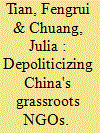| Srl | Item |
| 1 |
ID:
141093


|
|
|
|
|
| Summary/Abstract |
In recent years, the Chinese central state has launched the “new socialist countryside” campaign (NSCC), which authorizes the local state expropriation of rural land from farmers, and then incorporates evicted farmers into township residence and urban citizenship. In affected regions, this campaign enables local state officials to enact practices of bureaucratic absorption that undermine potential resistance by bringing resisters into formal channels of bargaining through both juridical and ideological means. Based on ethnographic data from Sichuan province, this article reveals an in situ process of bureaucratic absorption in “Lan-ding village,” where the incorporation of rural residents into urban citizenship enables the depoliticization of resistance to land expropriation, first by changing the citizenship-based grounds on which legitimate claims to land can be made, then by discursively reframing eviction as a normative shift towards modern wage dependence.
|
|
|
|
|
|
|
|
|
|
|
|
|
|
|
|
| 2 |
ID:
185622


|
|
|
|
|
| Summary/Abstract |
This article employs ethnographic fieldwork and interviews to examine two distinct processes of depoliticization by non-governmental organizations advocating rights for sex workers in China. Drawing upon Bourdieu and institutional theory, we argue that the consolidation of state repression of civil society under the Xi regime created an institutional field of power to which two NGOs responded differently. While one of them relied on government procurement as its major funding source, thus diluting the original mission, the other internalized state rhetoric as it sought political legitimacy through state certification, thus sanitizing its political mission. These distinct responses were then institutionalized into organizational practices, norms and culture. Rather than portraying NGOs in China as either capable political actors or pawns of an authoritarian state, this article illustrates how NGOs are subtly depoliticized by being inculcated in a state-produced, hierarchical social order in which compliance with state norms becomes synonymous with organizational competence.
|
|
|
|
|
|
|
|
|
|
|
|
|
|
|
|